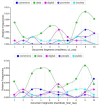Co-creation of the Digital Democracy and Data Commons Manifesto: alternative sociotechnical visions of data
- PMID: 39600591
- PMCID: PMC11589416
- DOI: 10.12688/openreseurope.17020.2
Co-creation of the Digital Democracy and Data Commons Manifesto: alternative sociotechnical visions of data
Abstract
Amid public concern surrounding the proprietary and exploitative use of personal data by corporations and public institutions, and its consequences from a sociotechnical perspective, narratives around digital commons have recently emerged, framing potential alternatives. This paper presents the co-creation of the Digital Democracy and Data Commons Manifesto through a collaborative writing sprint, drawing on principles of openness, diversity, and inclusivity. The manifesto articulates a technopolitical vision for data governance that prioritizes community control over data. We analyze the manifesto's evolution throughout the process, demonstrating its capacity to address contemporary concerns such as data extractivism and algorithmic governance. Our approach is based on participatory design methods, more concretely on a collaborative writing sprint, to co-create a manifesto on alternatives to current datafication, digital inequalities, and lack of citizen control over personal data. On the one hand, we describe the process of implementing a sprint approach for collaboratively writing a topic-specific manifesto, in the context of the broader EU project DECODE (Decentralised Citizen Owned Data Ecosystems). On the other hand, we present and analyse the main results from the content structure of the manifesto over its initial and final versions, which moved progressively as a cohesive text away from a scholarly and policy-oriented tone.
Keywords: Co-creation; Data Commons; Digital Democracy; Participatory Design; Sociotechnical Systems..
Copyright: © 2024 Senabre Hidalgo E et al.
Conflict of interest statement
No competing interests were disclosed.
Figures





References
-
- Barber B: Strong democracy: participatory politics for a new age.Univ of California Press,2003. Reference Source
-
- Bauwens M, Kostakis V, Pazaitis A: Peer to peer: the commons manifesto.London: University of Westminster Press,2019. 10.16997/book33 - DOI
-
- Benvenuti S: Pedagogy of peers: cultivating writing retreats as communities of academic writing practice. S Afr J High Educ. 2017;31(2):89–107. 10.20853/31-2-1340 - DOI
-
- Borrás S, Edler J: The roles of the state in the governance of socio-technical systems' transformation. Res Policy. 2020;49(5): 103971. 10.1016/j.respol.2020.103971 - DOI
LinkOut - more resources
Full Text Sources
